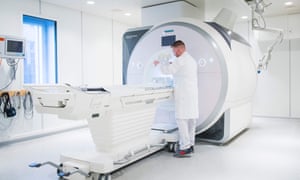Health - NEWS - MRI twice as likely as biopsy to spot prostate cancer, research shows
Finding could bring about change of practice in NHS with ‘potential to save many lives’, says charity
MRI picks up 93% of aggressive cancers, compared with 48% for a biopsy, researchers found. Photograph: Jonathan Nackstrand/AFP/Getty Images
Every man with suspected prostate cancer should have an MRI scan, which is twice as likely to identify the presence of dangerous tumours as the invasive biopsy used currently, say doctors. A major trial, which could influence a change of practice in the NHS, will amount to “the biggest leap forward in prostate cancer diagnosis in decades, with the potential to save many lives”, Prostate Cancer UK said. Researchers publishing in the Lancet medical journal have shown that an MRI picks up 93% of aggressive cancers, compared with 48% for a biopsy. The biopsy, which removes a sample of tissue for lab testing, often misses the tumour altogether.
The Prostate MRI Imaging Study (Promis), led by researchers at University College London (UCL), also showed that more than a quarter (27%) of all men with suspected cancer could avoid a biopsy altogether. MRI scans were shown to be better at ruling out cancer, as well as identifying tumours that are not dangerous because they are slow growing and do not need to be treated. In the trial, the number wrongly diagnosed with a cancer that needed treatment was reduced by 5%. “Prostate cancer has aggressive and harmless forms. Our current biopsy test can be inaccurate because the tissue samples are taken at random,” said the lead author, Dr Hashim Ahmed from UCL. “This means it cannot confirm whether a cancer is aggressive or not and can miss aggressive cancers that are actually there.
“Because of this some men with no cancer or harmless cancers are sometimes given the wrong diagnosis and are then treated even though this offers no survival benefit and can often cause side effects. On top of these errors in diagnosis, the current biopsy test can cause side effects such as bleeding, pain and serious infections.” Some men suffer a life-threatening sepsis – a bloodstream infection – as a result of the standard transrectal ultrasound-guided (TRUS) biopsy. This is the second breakthrough in prostate cancer treatment in two months. In December, UCL published a study showing that a laser-activated drug derived from bacteria at the bottom of the sea can kill prostate cancer cells without the sometimes devastating side-effects of surgery, which can leave men incontinent or impotent.
The introduction of the scan, called a multi-parametric MRI (mpMRI), into routine NHS practice is already on its way. The National Institute for Clinical Excellence (Nice), which produces guidelines for doctors on the most appropriate treatment for patients, has already launched an early review of prostate cancer diagnosis looking at the evidence from a previous trial in men with prostate cancer that has spread, and has been awaiting the results of this one. Some hospitals are already offering MRI before any biopsy, but it will take time before it is universal. MRI machines are now in high demand for other kinds of cancer diagnosis and there will have to be special training for the radiologists who interpret the scans, which takes a high level of expertise.
Prostate Cancer UK, which helped fund the research, is now working for the introduction of MRI scans into prostate cancer units. “The current diagnostic process for prostate cancer is notoriously imperfect, so any developments which offer improvements must be adopted as a matter of priority,” said Angela Culhane, its chief executive.
“That’s why we have already been working with a range of clinical experts and professional bodies to pinpoint the potential barriers to the widespread rollout of mpMRI before biopsy and start the work of addressing them ahead of time. Now the results are formally published, we will continue to use this insight to support health professionals and commissioners to make the necessary resource and practice changes without delay. Whilst it’s clear that the rollout of mpMRI before biopsy can’t just happen overnight, it’s critical that urgent action is taken to make it available to men.”
Source: The Guardian
